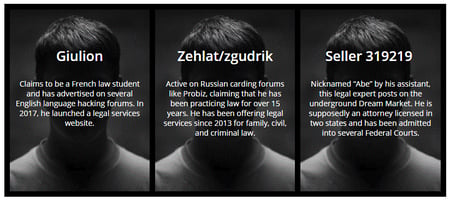Welcome to SecureWorld Behind the Scenes, our exclusive cybersecurity interview series.
Today, we’re interviewing Mayra Rosario Fuentes, Sr. Threat Researcher at Trend Micro, about her new research and a growing trend: Lawyers are advertising their services on the Dark Web to tap the cybercriminal legal market.
Some services are legitimate, others are completely illegal.
So what kind of services are attorneys selling on the Dark Web? Let's go behind the scenes to find out more about the new report, Ethics Need
Watch/listen here:
If you are pressed for time, here are excerpts from our interview with Mayra Rosario Fuentes:
[SW] When did Trend Micro first notice attorneys advertising on the Dark Web?
[Mayra] “We first noticed advertisements in 2013 on Silk Road. There was an advertisement labeled 'onion law,' and it was to connect users with lawyers around the U.S. that specialize in banking, commercial contracts, and criminal law.”
[SW] Now let’s fast forward as we go into 2019 on the Dark Web, what kind of illegitimate services are attorneys now offering?
[Mayra] “Right now, I’m seeing services for money laundering, it can be from consulting and how to conduct it, and there is a Russian lawyer that does an online course on money laundering, from start to finish. Several lawyers are offering fake passports and fake birth certificates. There are also lawyers offering real estate transactions with fake identities. I even found a lawyer that was offering sales of stolen credit cards.”
[SW] That is quite a list. Can you unpack one example for us that you came across in your research?
[Mayra] "It would be the money laundering. It’s unusual for a lawyer to be involved in something like that, to even offer what companies to use and give you a list of friends you can use."
[SW] We noticed in your report that one of the other things you did was to highlight three individual attorneys and their profiles.
[Mayra] "I spoke about three specific ones.
 Seller 319219 is a U.S. lawyer, barred [licensed] to work in New York and work with federal cases in the U.S. He’s offering one service I have not been able to find anywhere else: fugitive extraction service. You notify him of your issue, and he’ll decide whether or not to take your case. He’ll decide whether or not it's worth his time.
Seller 319219 is a U.S. lawyer, barred [licensed] to work in New York and work with federal cases in the U.S. He’s offering one service I have not been able to find anywhere else: fugitive extraction service. You notify him of your issue, and he’ll decide whether or not to take your case. He’ll decide whether or not it's worth his time.
Then there’s a Russian lawyer, Zehlat... he’s actually a licensed lawyer in Russia. In his case, I could find his license number and his office location. He offers carding and discount travel services [using hacked points and miles, for example]. He also will offer you call records from the major telecom companies in Russia.
And there is a French law student, Giulion… he is a second-year law student, and he already has his own website that he opened up this year to offer assistance with legal issues even though he’s not licensed. Most of his cases and comments from clients have said he helps a lot with copyright infringement. He also sells on the side stolen accounts, like Spotify."
[SW] Are you seeing legitimate services offered by attorneys? Is this some sort of untapped market for clients?
[Mayra] "Actually, it is. I did interview a lawyer, he was advertising his services out in the open so he had his full name, law firm, license number, he was not hiding his identity. He was offering help with family, civil, and criminal law. According to the American Bar Association, there is nothing wrong with advertising on the Dark Web as long as its not false advertising and they’re not hiding their identity. I asked him why he was advertising and he said, 'Why not? You’re closer to the criminals who may be needing your help.' So I think it is an untapped market, especially as the Bar Association decides what to do about cryptocurrency.
I’ve noticed a lot in forums, in these cybercriminal forums, there used to be no discussions about this. Now you see a lot of people asking, 'Hey, is there a lawyer in the forum?'"
[SW] Last question. When we’re at SecureWorld cybersecurity conferences across North America, we hear from many security leaders who are trying to mature their InfoSec programs. What I hear you describing is a maturing of legal services on the Dark Web. Do you feel the Dark Web communities, in general, are continuing to grow and become more sophisticated?
[Mayra] "I think it is getting more sophisticated. Right now I follow a lot of the Arabic forums, and I’m beginning to see trends that are similar to the Russian and English forums. I just published a report on how Arabic forums are learning how to use Telegram, there’s more discount travel, and I think it’s going to continue maturing. When one site closes, people jump to another popular one, so I don’t think it’s slowing down at any point.”
The SecureWorld media team would like to thank Mayra Rosario Fuentes for sharing her expertise. You should also read her team's full report on Dark Web lawyers for yourself, Ethics Need




